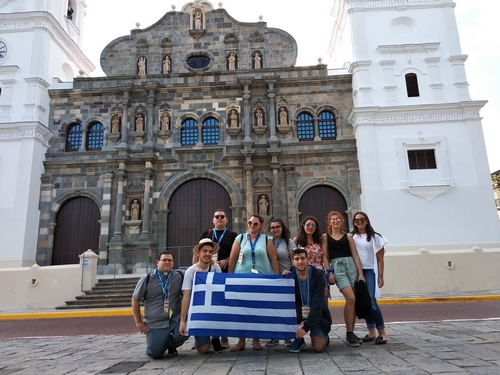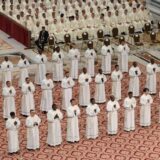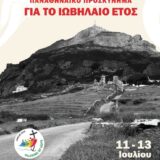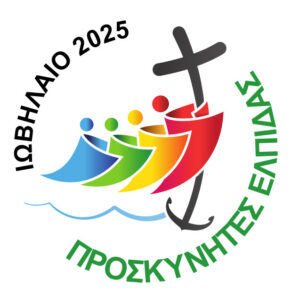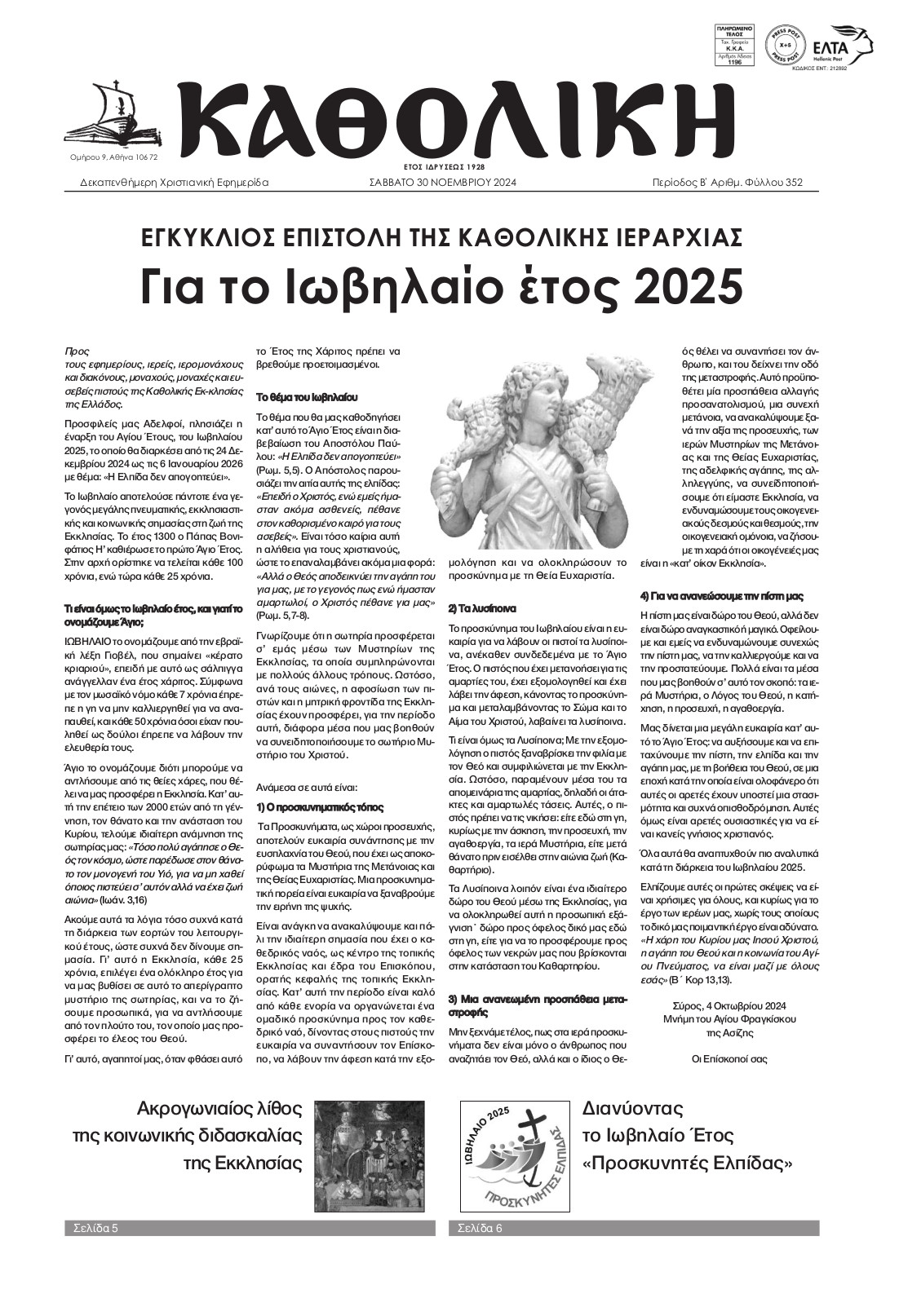
Την Τετάρτη 20 Μαρτίου ο Πάπας Φραγκίσκος δέχθηκε όλους τους εκπροσώπους των διαφόρων Ορθοδόξων Εκκλησιών, των λοιπών Χριστιανικών δογμάτων, διεκκλησιαστικών Οργανισμών και άλλων θρησκειών, που ήλθαν στη Ρώμη για την ενθρόνισή του, ενώ εκ μέρους όλων τον προσφώνησε ο Οικουμενικός Πατριάρχης κ. Βαρθολομαίος, τον οποίο και ευχαρίστησε ο Πάπας Φραγκίσκος αποκαλώντας τον «αδελφό Ανδρέα».
Προσφώνησις
τῆς Α. Θ. Παναγιότητος
τοῦ Οἰκουμενικοῦ Πατιάρχου
κ. κ. Βαρθολομαίου
πρός τήν Αὐτοῦ Ἁγιότητα
τόν Πάπαν Ρώμης Φραγκῖσκον Α'
(Βατικανόν, 20 Μαρτίου 2013)

Ἁγιώτατε,
Συγχαίρομεν ὁλοκαρδίως τήν Ὑμετέραν πεφιλημένην Ἁγιότητα, ἐν ὀνόματι τοῦ Κυρίου τῶν δυνάμεων, διά τήν θεοπρόβλητον ἐκλογήν καί ἐπαξίαν ἀνάληψιν τῶν νέων ὑψηλῶν καθηκόντων Σας ὡς Πρωθιεράρχου τῆς προκαθημένης τῆς ἀγάπης σεβασμίας Ἐκκλησίας τῆς Πρεσβυτέρας Ρώμης.
Διαδέχεσθε εἰς τόν Θρόνον τοῦτον τόν ἄρτι ἀνδρειοφρόνως παραιτηθέντα διά λόγους ὑγείας καί κοπώσεως προκάτοχόν Σας Βενέδικτον τόν ΙϚ΄, τόν πρᾷον καί τῇ θεολογίᾳ καί τῇ ἀγάπῃ διακριθέντα. Τό ἔργον καί ἡ εὐθύνη ἡ ὁποία Σᾶς ἀναμένει εἶναι τεραστία ἐνώπιον Θεοῦ καί ἀνθρώπων. Ἡ ἑνότης τῶν Χριστιανικῶν Ἐκκλησιῶν τυγχάνει τό πρώτιστον μέλημα ἡμῶν καί εἶναι ἀσφαλῶς μία ἐκ τῶν βασικῶν προϋποθέσεων διά τήν ἐνώπιον τῶν ὀμμάτων τῶν ἐγγύς καί τῶν μακράν ἀξιοπιστίαν τῆς χριστιανικῆς μαρτυρίας μας. Πρός ἐπίτευξιν αὐτῆς χρειάζεται νά συνεχισθῇ ὁ ἀρξάμενος θεολογικός διάλογος, διά νά κατανοηθῇ ἀπό κοινοῦ καί προσεγγισθῇ ἡ ἀλήθεια τῆς πίστεως καί ἡ ἐμπειρία τῶν Ἁγίων καί ἡ κοινή, δι' Ἀνατολήν καί Δύσιν, παράδοσις τῆς πρώτης χριστιανικῆς χιλιετίας. Διάλογος ἐν ἀγάπῃ καί ἀληθείᾳ, ἐν πνεύματι ταπεινώσεως καί πρᾳότητος, διά τῶν ὅπλων τῆς ἀληθείας.
Ἡ παγκόσμιος οἰκονομική κρίσις, ἐξ ἄλλου, ἀπαιτεῖ ἐπιτακτικῶς τήν ὀργάνωσιν ἀνθρωπιστικῆς δράσεως, διά τήν ὁποίαν ἔχετε μεγάλην ἐμπειρίαν ἐκ τῆς μακρᾶς καί εὐδοκίμου διακονίας Σας ὡς Καλοῦ Σαμαρείτου ἐν Λατινικῇ Ἀμερικῇ, ὅπου ἐδοκιμάσατε ὡς ποιμήν τήν πικρίαν τῆς ἀνθρωπίνης ταλαιπωρίας καί δυστυχίας, ὅσον ὀλίγοι ἀσφαλῶς. Πρέπει νά παρακινηθοῦν οἱ ἔχοντες νά προσφέρουν εἰς τούς μή ἔχοντας οἰκειοθελῶς καί μετά ἱλαρότητος. Κατ᾿ αὐτόν τόν τρόπον θά ἐξασφαλισθῇ διά τῆς δικαιοσύνης ἡ εἰρήνη, ἡ ὁποία εἶναι τό πανανθρώπινον αἴτημα καί ἡ προσμονή πάντων τῶν ἐθνῶν καί τῶν λαῶν.
Ὀφείλομεν νά τρέφωμεν τούς πεινῶντας, νά ἐνδύωμεν τούς γυμνούς, νά περιποιώμεθα τούς ἀσθενεῖς καί ἐν γένει νά μεριμνῶμεν διά τούς ὄντας ἐν ἀνάγκαις, διά νά ἀκούσωμεν παρά τοῦ Κυρίου τό "δεῦτε οἱ εὐλογημένοι τοῦ Πατρός μου, κληρονομήσατε τήν ἡτοιμασμένην ὑμῖν βασιλείαν" (Ματθ. κε΄ 34).
Ἡ ὑπό τῆς Ὑμετέρας πεφιλημένης καί τετιμημένης Ἁγιότητος ἐπιλογή τῆς ἁπλότητος κατέστησε καί καθιστᾷ ἐμφανές τό κριτήριόν Σας διά τό οὐσιῶδες. Τοῦτο πληροῖ τάς καρδίας ὅλων, τῶν ὅπου γῆς πιστῶν σας καί ἐν γένει τῶν συνανθρώπων, ἐλπίδος∙ ἐλπίδος ὅτι τό κριτήριόν Σας τοῦτο θά χρησιμοποιηθῇ εὐρύτερον, οὕτως ὥστε ἡ κρίσις καί τό ἔλεος, τά βαρύτερα τοῦ νόμου, νά ἔχουν διά τήν Ἐκκλησίαν τήν προέχουσαν σημασίαν.
Κατά τήν διάρκειαν τοῦ δισχιλιετοῦς βίου τῆς Ἐκκλησίας τοῦ Χριστοῦ, ἀλήθειαί τινες τοῦ Ἱεροῦ Εὐαγγελίου παρενοήθησαν ὑπό ἐνίων χριστιανικῶν ὁμάδων, ὥστε σήμερον εἰς τά εὐρέα στρώματα τῶν χριστιανικῶν λαῶν νά ἐπικρατοῦν, ὡς μή ἔδει, ἐκκοσμικευμέναι ἀντιλήψεις. Πολυεύθυνον καί ἐπιτακτικόν τό καθῆκον καί τό χρέος ὅλων μας νά ὑπενθυμίσωμεν πρός ἑαυτούς καί ἀλλήλους καί πρός πάντας, ὅτι ὁ Θεός κατῆλθεν ἐξ οὐρανοῦ εἰς τήν γῆν, γενόμενος ἄνθρωπος, ὁ Ἰησοῦς Χριστός, ἵνα τό πολίτευμα ἡμῶν βιωθῇ ὡς ἐν οὐρανοῖς ὑπάρχον. Ἀληθῶς, "Θεός Κύριος καί ἐπέφανεν ἡμῖν" ἀπ᾿ ἀρχῆς δημιουργός τοῦ παντός, διέπων τά πάντα, ἄχρι θανάτου κατελθών, θανάτου δέ Σταυροῦ, ἵνα διά τῆς Ἀναστάσεώς Του καταδείξῃ ὅτι "εὐλογημένος ὁ ἐρχόμενος ἐν Ὀνόματι Κυρίου", καί μόνον ἐν ὀνόματι Αὐτοῦ, εἰς διακονίαν τοῦ πληρώματος, ἵνα πάντες ἕν ὦμεν, τά δέ πάντα καί ἐν πᾶσι Χριστός.
Ἡ γῆ εἶναι ὁ χῶρος τῆς ἀσκήσεώς μας, τῆς πραγματοποιήσεως τῆς ἐνσωματώσεώς μας εἰς τόν Χριστόν∙ καί τῆς δι΄ Αὐτοῦ μεταβάσεώς μας εἰς τήν αἰώνιον ζωήν. Ἡ Ἐκκλησία εὐλογεῖ τήν ἐπίγειον ζωήν, ἀλλά δέν τερματίζει τήν ἀποστολήν της εἰς αὐτήν. Τό γνωρίζομεν καί τό ὁμολογοῦμεν, διά τοῦτο καί πορευόμεθα οἱ ποιμένες καί οἱ πιστοί τήν ὁδόν τῆς ἀληθείας διά τῶν ἐπιγείων κατεργαζόμενοι τά ἐπουράνια.
Εἴμεθα βέβαιοι προσωπικῶς καί ὡς Οἰκουμενικόν Πατριαρχεῖον καί ὡς ὅπου γῆς Ὀρθόδοξος τοῦ Χριστοῦ Ἐκκλησία ὅτι ἡ Ὑμετέρα σεβασμία καί πολυφίλητος ἐν Κυρίῳ Ἁγιότης, ἡ ἐπ᾿ αἰσίοις τοῖς οἰωνοῖς καταρχομένη τοῦ ἱστορικοῦ δολίχου Αὐτῆς ὡς Ἐπισκόπου Ρώμης, θά ἐπιδείξῃ ἰδιαίτερον ἐνδιαφέρον, ἐν συνεργασίᾳ μετά πάντων τῶν δυναμένων καί βουλομένων, διά τήν διόρθωσιν τῶν ἐκκοσμικευμένων τάσεων ὥστε νά ἐπανέλθῃ ὁ ἄνθρωπος εἰς τό "ἀρχαῖον κάλλος" τῆς ἀγάπης.
Εὐχόμεθα ὁλοθύμως, μετά πάντων τῶν ὅπου γῆς χριστιανῶν πιστῶν, καί μεθ᾿ ἡμῶν συνεύχεται ἅπασα ἡ ἀνθρωπότης, ὅπως ἡ Ἁγιότης Σας ἐπιτύχῃ εἰς τό ὑψηλόν, πολυεύθυνον καί δυσχερές ἔργον Αὐτῆς.
Εὐλογητός καί δεδοξασμένος ὁ Κύριος ἡμῶν Ἰησοῦς Χριστός. Δόξα τῷ Θεῷ τῷ ἀναδεικύοντι ἐν ἑκάστῃ χρονικῇ περιόδῳ τούς ἀξίους ἵνα ἀξίως τῆς κλήσεως πορευθοῦν καί ὁδηγήσουν τήν ἀνθρωπότητα, εἰς δόξαν τοῦ Πατρός καί τοῦ Υἱοῦ καί τοῦ Ἁγίου Πνεύματος. Ἀμήν.
ΠΗΓΗ: http://www.ec-patr.org/docdisplay.php?lang=gr&id=1640&tla=gr

ADDRESS OF THE HOLY FATHER POPE FRANCIS
Clementine Hall
Wednesday, 20 March 2013
[Video]
Dear Brothers and Sisters,
Before all else, I express my heartfelt thanks for what my brother Andrew [Ecumenical Patriarch Bartholomaios I] has said to us. Many thanks! Many thanks!
It is a source of particular joy for me to meet today with you, the delegates of the Orthodox Churches, of the Oriental Orthodox Churches and of the Ecclesial Communities of the West. I thank you for taking part in the celebration which marked the beginning of my ministry as the Bishop of Rome and the Successor of Peter.
Yesterday morning, during Holy Mass, through you I felt the spiritual presence of the communities which you represent. In this expression of faith, it seemed that we were experiencing all the more urgently the prayer for unity between believers in Christ and at the same time seeing prefigured in some way its full realization, which depends on God’s plan and our own faithful cooperation.
I begin my apostolic ministry during this year which my venerable predecessor Benedict XVI, with truly inspired intuition, proclaimed for the Catholic Church as a Year of Faith. With this initiative, which I wish to continue and which I trust will prove a stimulus for our common journey of faith, he wanted to mark the fiftieth anniversary of the beginning of the Second Vatican Council by proposing a sort of pilgrimage towards what all Christians consider essential: the personal, transforming encounter with Jesus Christ, the Son of God, who died and rose for our salvation. The core message of the Council is found precisely in the desire to proclaim this perennially valid treasure of faith to the men and women of our time.
Along with you, I cannot forget all that the Council meant for the progress of ecumenism. Here I would like to recall the words of Blessed John XXIII, the fiftieth anniversary of whose death we shall soon celebrate, in his memorable opening address: "The Catholic Church considers it her duty to work actively for the fulfilment of the great mystery of that unity for which Jesus Christ prayed so earnestly to his heavenly Father on the eve of his great sacrifice; the knowledge that she is so intimately associated with that prayer is for her an occasion of ineffable peace and joy" (AAS 54 [1962], 793]. These were the words of Pope John.
Yes, dear brothers and sisters in Christ, let us all feel closely united to the prayer of our Saviour at the Last Supper, to his appeal: ut unum sint. Let us ask the Father of mercies to enable us to live fully the faith graciously bestowed upon us on the day of our Baptism and to bear witness to it freely, joyfully and courageously. This will be the best service we can offer to the cause of Christian unity, a service of hope for a world still torn by divisions, conflicts and rivalries. The more we are faithful to his will, in our thoughts, words and actions, the more we will progress, really and substantially, towards unity.
For my part, I wish to assure you that, in continuity with my predecessors, it is my firm intention to pursue the path of ecumenical dialogue, and I thank the Pontifical Council for Promoting Christian Unity for the help that it continues to provide, in my name, in the service of this most noble cause. I ask you, dear brothers and sisters, to bring my cordial greetings and the assurance of my prayerful remembrance in the Lord Jesus to the Christian communities which you represent, and I beg of you the charity of a special prayer for me, that I may be a pastor according to the heart of Christ.
And now I turn to you, the distinguished representatives of the Jewish people, to whom we are linked by a most special spiritual bond, since, as the Second Vatican Council stated "the Church of Christ recognizes that in God’s plan of salvation the beginnings of her faith and her election are to be found in the patriarchs, Moses and the prophets" (Nostra Aetate, 4). I thank you for your presence and I trust that, with the help of the Most High, we can make greater progress in that fraternal dialogue which the Council wished to encourage (cf. ibid.) and which has indeed taken place, bearing no little fruit, especially in recent decades.
I also greet and cordially thank all of you, dear friends who are followers of other religious traditions; first Muslims, who worship God as one, living and merciful, and invoke him in prayer, and all of you. I greatly appreciate your presence: in it, I see a tangible sign of a will to grow in mutual esteem and in cooperation for the common good of humanity.
The Catholic Church is conscious of the importance of promoting friendship and respect between men and women of different religious traditions – I want to repeat this: promoting friendship and respect between men and women of different religious traditions – a sign of this can be seen in the important work carried out by the Pontifical Council for Interreligious Dialogue. The Church is likewise conscious of the responsibility which all of us have for our world, for the whole of creation, which we must love and protect. There is much that we can do to benefit the poor, the needy and those who suffer, and to favour justice, promote reconciliation and build peace. But before all else we need to keep alive in our world the thirst for the absolute, and to counter the dominance of a one-dimensional vision of the human person, a vision which reduces human beings to what they produce and to what they consume: this is one of the most insidious temptations of our time.
We know how much violence has resulted in recent times from the attempt to eliminate God and the divine from the horizon of humanity, and we are aware of the importance of witnessing in our societies to that primordial openness to transcendence which lies deep within the human heart. In this, we also sense our closeness to all those men and women who, although not identifying themselves as followers of any religious tradition, are nonetheless searching for truth, goodness and beauty, the truth, goodness and beauty of God. They are our valued allies in the commitment to defending human dignity, in building a peaceful coexistence between peoples and in safeguarding and caring for creation.
Dear friends, once again I thank you for your presence. I offer all of you my heartfelt, fraternal good wishes.
DISCORSO DEL SANTO PADRE FRANCESCO
Sala Clementina
Mercoledì, 20 marzo 2013
[Video]
Cari fratelli e sorelle,
Prima di tutto ringrazio di cuore quello che il mio Fratello Andrea [n.d.r. il Patriarca Ecumenico Bartolomeo I] ci ha detto. Grazie tante! Grazie tante!
È motivo di particolare gioia incontrarmi oggi con voi, Delegati delle Chiese Ortodosse, delle Chiese Ortodosse Orientali e delle Comunità ecclesiali di Occidente. Vi ringrazio per avere voluto prendere parte alla celebrazione che ha segnato l’inizio del mio ministero di Vescovo di Roma e Successore di Pietro.
Ieri mattina, durante la Santa Messa, attraverso le vostre persone ho riconosciuto spiritualmente presenti le comunità che rappresentate. In questa manifestazione di fede mi è parso così di vivere in maniera ancor più pressante la preghiera per l’unità tra i credenti in Cristo e insieme di vederne in qualche modo prefigurata quella piena realizzazione, che dipende dal piano di Dio e dalla nostra leale collaborazione.
Inizio il mio ministero apostolico durante quest’anno che il mio venerato predecessore, Benedetto XVI, con intuizione veramente ispirata, ha proclamato per la Chiesa cattolica Anno della fede. Con questa iniziativa, che desidero continuare e spero sia di stimolo per il cammino di fede di tutti, egli ha voluto segnare il 50° anniversario dell’inizio del Concilio Vaticano II, proponendo una sorta di pellegrinaggio verso ciò che per ogni cristiano rappresenta l’essenziale: il rapporto personale e trasformante con Gesù Cristo, Figlio di Dio, morto e risorto per la nostra salvezza. Proprio nel desiderio di annunciare questo tesoro perennemente valido della fede agli uomini del nostro tempo, risiede il cuore del messaggio conciliare.
Insieme con voi non posso dimenticare quanto quel Concilio abbia significato per il cammino ecumenico. Mi piace ricordare le parole che il beato Giovanni XXIII, di cui ricorderemo tra breve il 50° della scomparsa, pronunciò nel memorabile discorso di inaugurazione: «La Chiesa Cattolica ritiene suo dovere adoperarsi attivamente perché si compia il grande mistero di quell’unità che Cristo Gesù con ardentissime preghiere ha chiesto al Padre Celeste nell’imminenza del suo sacrificio; essa gode di pace soavissima, sapendo di essere intimamente unita a Cristo in quelle preghiere» (AAS 54 [1962], 793). Questo Papa Giovanni.
Sì, cari fratelli e sorelle in Cristo, sentiamoci tutti intimamente uniti alla preghiera del nostro Salvatore nell’Ultima Cena, alla sua invocazione: ut unum sint. Chiediamo al Padre misericordioso di vivere in pienezza quella fede che abbiamo ricevuto in dono nel giorno del nostro Battesimo, e di poterne dare testimonianza libera, gioiosa e coraggiosa. Sarà questo il nostro migliore servizio alla causa dell’unità tra i cristiani, un servizio di speranza per un mondo ancora segnato da divisioni, da contrasti e da rivalità. Più saremo fedeli alla sua volontà, nei pensieri, nelle parole e nelle opere, e più cammineremo realmente e sostanzialmente verso l’unità.
Da parte mia, desidero assicurare, sulla scia dei miei Predecessori, la ferma volontà di proseguire nel cammino del dialogo ecumenico e ringrazio sin d’ora il Pontificio Consiglio per la Promozione dell’Unità dei Cristiani, per l’aiuto che continuerà ad offrire, in mio nome, per questa nobilissima causa. Vi chiedo, cari fratelli e sorelle, di portare il mio cordiale saluto e l’assicurazione del mio ricordo nel Signore Gesù alle Chiese e Comunità cristiane che qui rappresentate, e domando a voi la carità di una speciale preghiera per la mia persona, affinché possa essere un Pastore secondo il cuore di Cristo.
Ed ora mi rivolgo a voi distinti rappresentanti del popolo ebraico, al quale ci lega uno specialissimo vincolo spirituale, dal momento che, come afferma il Concilio Vaticano II, «la Chiesa di Cristo riconosce che gli inizi della sua fede e della sua elezione si trovano già, secondo il mistero divino della salvezza, nei patriarchi, in Mosè, e nei profeti» (Decr. Nostra aetate, 4). Vi ringrazio della vostra presenza e confido che, con l’aiuto dell’Altissimo, potremo proseguire proficuamente quel fraterno dialogo che il Concilio auspicava (cfr ibid.) e che si è effettivamente realizzato, portando non pochi frutti, specialmente nel corso degli ultimi decenni.
Saluto poi e ringrazio cordialmente tutti voi, cari amici appartenenti ad altre tradizioni religiose; innanzitutto i Musulmani, che adorano Dio unico, vivente e misericordioso, e lo invocano nella preghiera, e voi tutti. Apprezzo molto la vostra presenza: in essa vedo un segno tangibile della volontà di crescere nella stima reciproca e nella cooperazione per il bene comune dell’umanità.
La Chiesa cattolica è consapevole dell’importanza che ha la promozione dell’amicizia e del rispetto tra uomini e donne di diverse tradizioni religiose – questo voglio ripeterlo: promozione dell’amicizia e del rispetto tra uomini e donne di diverse tradizioni religiose – lo attesta anche il prezioso lavoro che svolge il Pontificio Consiglio per il Dialogo Interreligioso. Essa è ugualmente consapevole della responsabilità che tutti portiamo verso questo nostro mondo, verso l’intero creato, che dobbiamo amare e custodire. E noi possiamo fare molto per il bene di chi è più povero, di chi è debole e di chi soffre, per favorire la giustizia, per promuovere la riconciliazione, per costruire la pace. Ma, soprattutto, dobbiamo tenere viva nel mondo la sete dell’assoluto, non permettendo che prevalga una visione della persona umana ad una sola dimensione, secondo cui l’uomo si riduce a ciò che produce e a ciò che consuma: è questa una delle insidie più pericolose per il nostro tempo.
Sappiamo quanta violenza abbia prodotto nella storia recente il tentativo di eliminare Dio e il divino dall’orizzonte dell’umanità, e avvertiamo il valore di testimoniare nelle nostre società l’originaria apertura alla trascendenza che è insita nel cuore dell’uomo. In ciò, sentiamo vicini anche tutti quegli uomini e donne che, pur non riconoscendosi appartenenti ad alcuna tradizione religiosa, si sentono tuttavia in ricerca della verità, della bontà e della bellezza, questa verità, bonta e bellezza di Dio, e che sono nostri preziosi alleati nell’impegno a difesa della dignità dell’uomo, nella costruzione di una convivenza pacifica fra i popoli e nel custodire con cura il creato.
Cari amici, grazie ancora per la vostra presenza. A tutti vada il mio cordiale e fraterno saluto.
